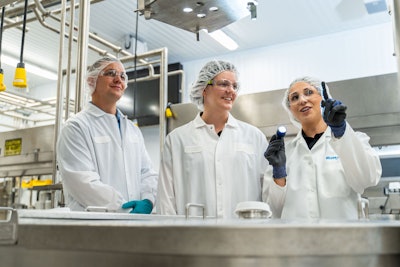
Each September, National Food Safety Education Month serves as a reminder for the entire food industry that preventing foodborne illness is an ongoing commitment. For Nelson-Jameson, this month, and every month, is an opportunity to reinforce our own commitment to helping protect the food supply.
The 'Why' – Safeguarding Public Trust and Health
The statistics surrounding foodborne illness are sobering: the FDA estimates approximately 48 million cases annually, affecting about 1 in 6 Americans each year. These illnesses lead to an estimated 128,000 hospitalizations annually. This reality underscores the shared duty and obligation within the food industry to keep consumers safe.
Beyond that tangible impact, food safety issues carry significant reputational and financial implications. Food safety incidents can quickly go viral, leading to swift and unforgiving judgment in the court of public opinion. Financially, a product recall alone can cost around $10 million, not including potential litigation and lasting brand damage.
This is why the Nelson-Jameson team believes that fostering public trust in our food supply is a collective effort – a rising tide lifts all boats when it comes to food safety.
Providing Comprehensive Resources
Nelson-Jameson's commitment to food safety is centered on education. The philosophy is to provide resources and services to share expertise and better understand and serve the demands of a safe food supply chain.
Here are the key elements of our recommended approach to food safety resources:
Industry collaboration: Food safety is not competitive. Partner with industry leaders to collaborate, curate, and develop resources, training, and opportunities for food safety excellence.
Cultivate future leaders: Actively contribute to educational institutions by providing resources to assist students and the next generation of food safety researchers, scholars, and industry professionals.
Educational offerings: Share workshops, webinars, and educational materials and make them accessible to anyone in the food industry. These include food safety solution catalogs and buying guides with additional educational content.
Practical support: On-site or virtual trainings and assessments covering areas like ATP,hand hygiene and working closely with suppliers and manufacturers are the best ways to provide hands-on support. Laboratory and Food Safey and Quality specialists can provide powerful expertise for implementation and specific topic areas.
Proactive prevention tools: Help prevent cross-contamination and quality issues by advocating for the use of supplies such as:
Color-coded tools and solutions: This simple yet effective program helps designate tools for specific areas, preventing cross-contamination from allergens or pathogens.
Food-grade materials for PPE.
Metal-detectable PPE: This helps prevent foreign objects from contaminating food products.
Hand hygiene solutions: Emphasizing the critical role of proper hand washing.
Indicator Testing: Help address hygiene, contamination risk and spoilage.
Opt-in on operational excellence: SQF certification is the adherence to stringent standards that bolster consumer confidence and ensure compliance with international regulations. Quality and safety audits help in evaluating and enhancing plant efficiency, safety, and compliance.
Holistic Reviews – All Month, All Year
Food Safety Education Month is an ideal time for organizations to conduct a holistic safety audit, examining worker safety practices through the lens of food safety, and vice versa. This means evaluating protocols for continuous improvement, engaging employees in the PPE selection process for better compliance, and recognizing the link between physical/psychological well-being and a safe work environment.
All food manufacturers should emphasize that food safety culture demands constant vigilance and focus. It's a continuous practice of educating and reminding employees, ensuring new staff are properly trained, and that food safety remains a cultural epicenter of the business. Utilize the vast array of available resources and remember that food safety is a team sport. By investing in the safety and well-being of employees and equipping them with quality tools and knowledge, food manufacturers not only create a safer workplace but also safeguard their brand, their products, and, most importantly, their consumers.
Jessica Dolinsky is the Director of Category Strategy - Food Safety & Quality at Nelson-Jameson, a leading distributor in the food processing industry.




















